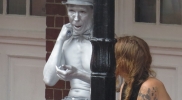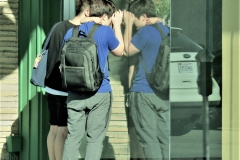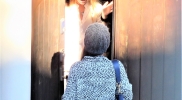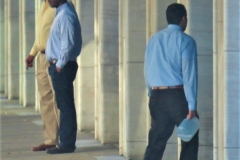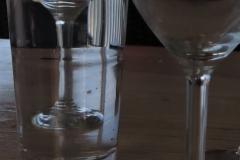|
|
Best Trivia - Slang
|
Favorite Trivia – SORROW
|
| “Light sorrows speak, but deeper ones are dumb.”
Hippocrates
|
| “That best nurse of troubles, Night.”
Ovid
|
| “They tell me that H. is happy now, they tell me she is at peace. What makes them so sure of this?. . . why are they so sure that all anguish ends with death? More than half the Christian world, and millions in the East, believe otherwise. How do they know she is ‘at rest.'”
C.S. Lewis – A Grief Observed
|
“Every time I been down
I tell myself,
so is the sun—
but he gonna be up high
come early in the morning.”
Pamela Strobel
|
“Resolve to be thyself: and know, that he
Who finds himself, loses his misery.”
Self-Dependence – Mathew Arnold
|
| “There is only one way to avoid criticism: do nothing, say nothing, and be nothing.”
Aristotle
|
| “If the secret troubles of every one were written on his forehead for all to read, how many who now excite envy, would excite our pity.”
Pietro Metastasio
|
| “Isn’t discontent the lever of change?”
John Steinbeck – Sweet Thursday
|
| “It is worse than foolish to tear one’s hair in grief, as if sorrow could be relieved by baldness.”
Bion
|
| “Here I and sorrow sit.”
Shakespeare – King John
|
“About suffering they were never wrong,
The Old Masters: how well they understood
Its human position; how it takes place
While someone else is eating or opening a window or just walking dully along . . .”
W.H. Auden – Musée des Beaux Arts
|
| “Tears are the safety valve of the heart when too much pressure is laid on it.”
Albert Smith
|
| “The cause of suffering, as the Buddha saw it, is not thinking itself but clinging to our thoughts. All of the trivial and essential things bobbing around in our consciousness—cash and careers, mobile phones and sports cars, houses and health clubs, family and friends, privileges and perks—ebb and flood according to their own rhythms. Wanting, enjoying, and striving for these things is not the problem; clinging to them at all costs is.”
Geary – The World in a Phrase: A Brief History of the Aphorism
|
| “Aren’t these notes the senseless writhings of a man who won’t accept the fact that there is nothing we can do with suffering except to suffer it? Who still thinks there is some device (if only he could find it) which will make pain not be pain. It doesn’t really mater whether you grip the arms of the dentist’s chair or let your hands lie in your lap. The drill drills on. . .”
C.S. Lewis – A Grief Observed
|
| “I have never described, even in the diary, the act of self-murder which takes place after my being with people. A sense of shame for the most trivial defect, lack, slip, error, for every statement made, or for my silence, for being too gay or too serious, for not being earthy enough, or for being too passionate, for not being free, or being too impulsive, for not being myself or being too much so.” [January 15, 1946]
Mirages: The Unexpurgated Diary of Anaïs Nin, 1939-1947, edited by Paul Herron
|
| “‘A man may have some fresh grief over which to mourn,’ the poet [Hesiod] wrote in Theogony, ‘and sorrow may have left him no more tears . . . but the heavy-hearted man soon shakes off his dark mood, and forgetfulness soothes his grief, for this gift of the gods diverts his mind.'”
Thomas DeBaggio – Losing My Mind: An Intimate Look at Life with Alzheimer’s
|
“What profit then to live? Let me in haste
Cast myself down from yonder dizzy height,
And buy with one swift leap deliverance
From all my labours! Once to die is better
Than length of days in sorrow without end.” [Prometheus]
Prometheus Bound – Aeschylus (trans. by George Thomson)
|
“Better to die once and for all
than drag out my days in misery.”
Prometheus Bound – Aeschylus (trans. by James Scully)
|
| “I now come to a moment when I need strength to confess my weakness. The man who tries to take his life shows not so much the vigour of his soul as the feebleness of his nature.
“I owned a fowling-piece whose worn trigger often went off when it was uncocked. I loaded this gun with three bullets and went to a remote part of the Great Mall. I cocked the gun, placed the muzzle in my mouth, and stuck the butt against the ground; I did this several times, but the gun did not go off; the appearance of a gamekeeper interrupted me. An involuntary and unconscious fatalist, I concluded that my hour had not come, and I postponed the execution of my plan to another day. If I had killed myself, all that I have been would have been buried with me . . .”
François-René de Chateaubriand – The Memoirs of Chateaubriand
|
| “What is grief compared with physical pain? Whatever fools may say, the body can suffer twenty times more than the mind. The mind has always some power of evasion. At worst, the unbearable thought only comes back and back, but physical pain can be absolutely continuous. Grief is like a bomber circling round and dropping its bombs each time the circle brings it overhead; physical pain is like the steady barrage on a trench in World War One, hours of it with no let-up for a moment.”
C.S. Lewis – A Grief Observed
|
|
In 1861, Prince Albert died. Queen Victoria’s grief was such that she did not appear in public for three years. She never entirely got over the loss, and until the end of her life she had her maids nightly lay out Albert’s clothes for the next day and in the morning replace the water in the basin in his room.
|
| “O helpless agony, fruitful in fruitless tears.” [Chorus: Epode]
Prometheus Bound – Aeschylus (trans. by George Thomson)
|
| “On August 24, a blisteringly hot day, a friend invited us to a film showing of the coronation of Queen Elizabeth II. Sylvia said she wanted to stay home with her grandparents . . . I found it difficult to concentrate . . . I left her with a sense of uneasiness . . . I forced myself to remain quiet until the close, then begged my friend to drive me home at once. Propped against a bowl of flowers on the dining-room table was a note in Sylvia’s handwriting: ‘Have gone for a long walk. Will be home tomorrow’. . .
“The report of Sylvia’s disappearance, which I phoned to the police, was issued over the radio. Then I discovered that the lock to my steel case had been broken open and the bottle of sleeping pills was missing.
“At noon on the third day, while we were eating lunch, Warren was the first to discern a moan coming from the region of our basement. He dashed from the table before any of the rest of us could move, and then we heard his shout, ‘Call the ambulance!’ He had found his sister returning to consciousness in the crawl space beneath the downstairs bedroom, the entrance to which had always been blocked by a pile of firewood. A partially empty bottle of sleeping pills was by her side.” [Introduction to Part Two]
Sylvia Plath – Letters Home: Correspondence 1950-1963, ed. by Aurelia Schober Plath
|

Comments are closed.
|
|
























